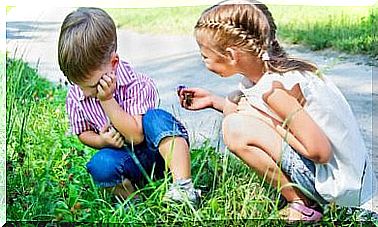The Importance Of Tenderness For The Development Of The Brain
The first three years of your baby’s life are fundamental to the development of the brain. Hundreds of important systems are being developed during this time, especially those involved in dealing with the emotional response to stress.
Sue Gerhardt, a British psychotherapist primarily focused on babies, explains that it is very important that babies do not experience too much stress. This can prevent the natural development of neural connections that are formed during the development of the brain.
Infants are very sensitive to stress, says Sue Gerhardt, who is also the author of the book Why love matters. The psychotherapist explained in an interview with the scientific author Edward Punset that stress produces cortisol. Too much of this hormone can prevent the development of the brain because it prevents the neural connections in the baby’s brain.
In fact , different biochemical circuits in the inner parts of the brain begin to develop during the first three years of a child’s life. This means that they are not born with these but rather that they develop, or not, depending on their experiences. The development of the brain thus depends on the care, supervision and tenderness that they receive from significant adults.
This is why it is so important to make eye contact with babies as well as to smile at them, play with them, hold them in our arms, touch them and massage them. All of these actions produce feelings of pleasure and security, which help prevent stress, manage cortisol levels and allow a healthy development of the brain.

Love is an ally in the development of the brain
Attachment parenting or close parenting helps to develop mechanisms that regulate their own cortisol. When babies are born, they cannot regulate this on their own. So they depend on the parents and other adults around them to do it.
Gerhardt claims that it is very stressful for infants to be away from their guardians for a long time. They depend on them for their survival. This is why it can be so difficult for them to be left alone crying in the crib.
Experts list different types of situations that can be very stressful for babies. It includes overstimulation such as sound or seeing many new faces at a family event. The frustration and fear of falling every time they try to crawl or walk is another example.
These are all situations that can cause a lot of stress for your baby. Thinking about it can also stress you or any other adult. The difference is that we adults already have a developed mechanism that helps us deal with high levels of cortisol.
Naturally, we take a cup of coffee or tea when we feel overwhelmed. We call a friend, take a walk, jog or read a book… But the only thing a baby has is you and that is why it cries when you leave.

Your child needs to feel secure in order to develop properly
The safety a baby feels in his mother’s arms is just as important as sleep, food or protection from the weather, wind or other external threats. The attachment theory was first presented by the English infant psychiatrist John Bowlby and not surprisingly it shows the following:
From the time the baby is born until it becomes independent, it needs its mother’s body, warmth, attention and affection. It can also be another close guardian who knows how to interpret and meet the infant’s needs to create a strong bond.
All the love and care you offer your child contributes to its brain developing wonderful connections that will help it resolve and deal with whatever situations it may face in life.
We do not try to be poetic, nor are we stupid. In fact, neuroscience has already provided us with information about the importance of tenderness in the relationship and the development of bonds between newborns and their mothers. This is because the brain is dependent on the infant’s external interactions, especially in affectionate relationships with its parents.
In fact, the love that a mother shows her child as well as attachment parenting during the first years of childhood (up to the age of five) encourages the development of the little one’s brain. This is in accordance with the findings of studies conducted by researchers at the School of Medicine at Washington University in St. Petersburg. Louis.









